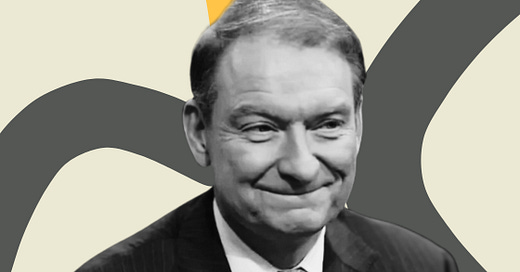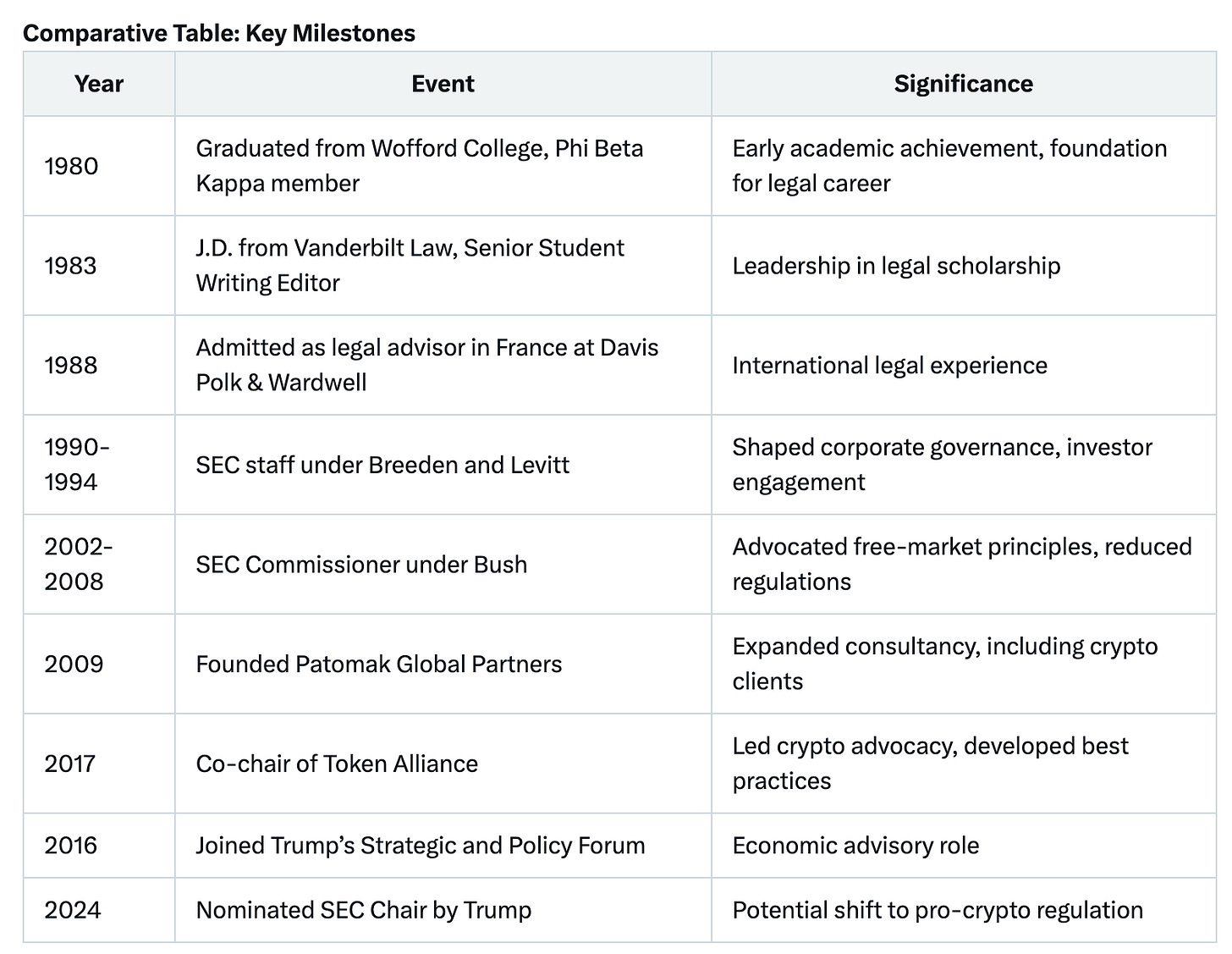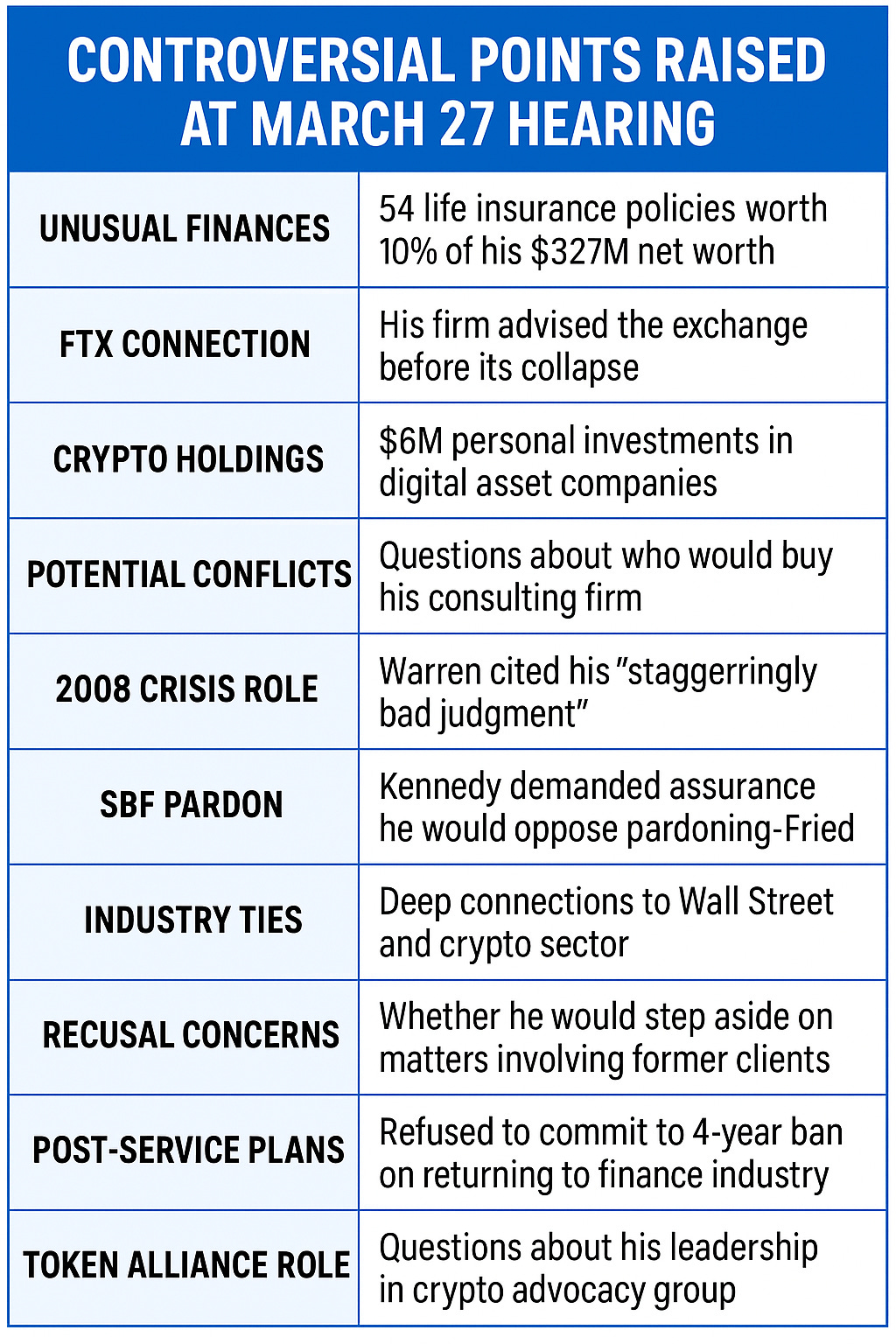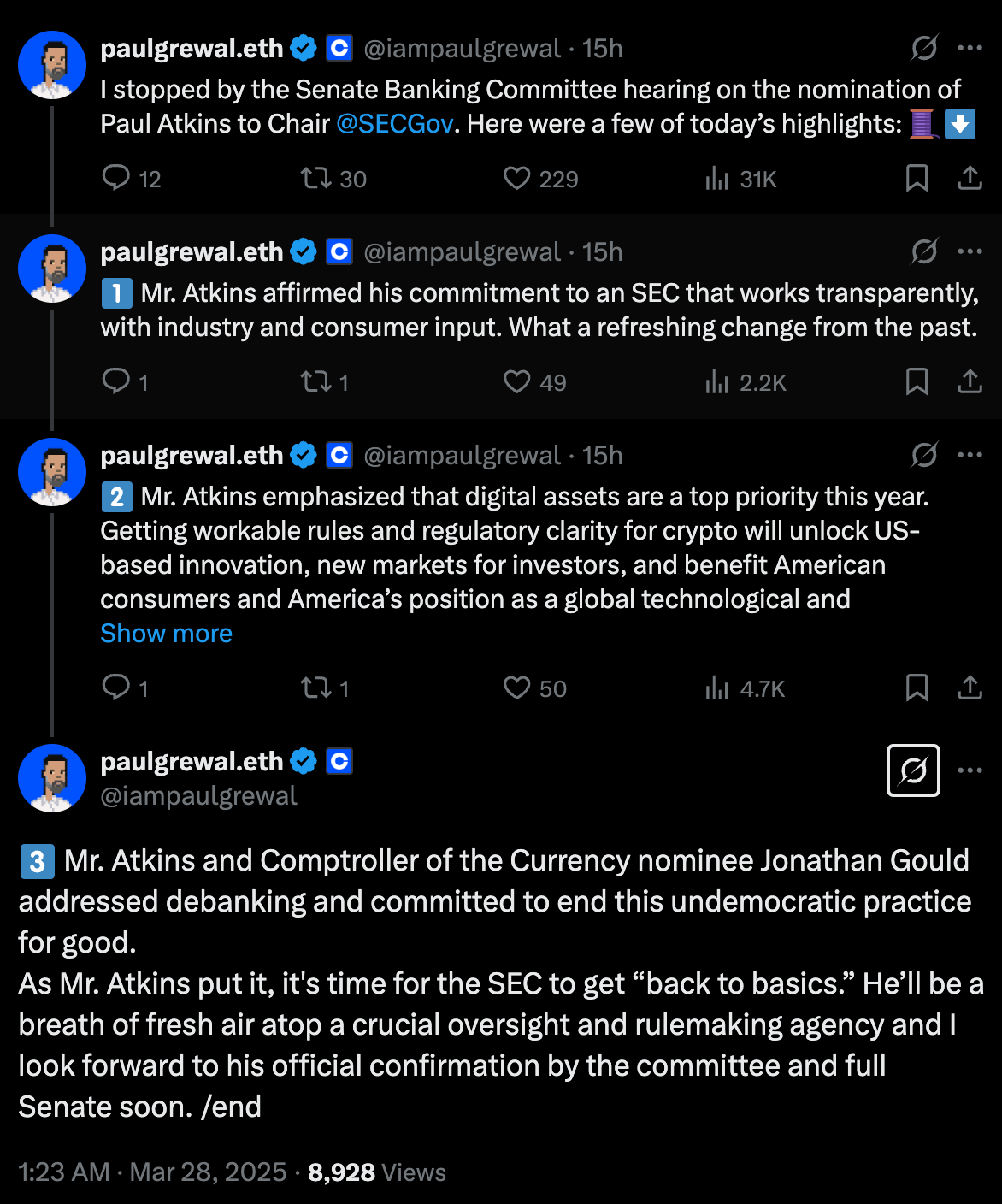TGIF Dispatchers.
The Senate Banking Committee chamber fell silent as Elizabeth Warren leaned into her microphone.
"You've got 54 different life insurance policies," she said, fixing her gaze on the man seated before her. "That's more than 10% of your estimated $327 million net worth. Care to explain why?"
It was the kind of pointed question that has defined Paul Atkins' confirmation battle – a process that has exposed not just his regulatory philosophy, but the intricate personal finances of a man now tasked with overseeing America's capital markets.
After a gruelling seven-hour hearing on March 27, Trump's pick for SEC Chair emerged bruised but unbowed. His testimony revealed a lifelong tension between free-market principles and the practical demands of investor protection – a tension now at the centre of America's crypto regulatory debate.
"A top priority of my chairmanship will be to work with my fellow Commissioners and Congress to provide a firm regulatory foundation for digital assets through a rational, coherent, and principled approach," Atkins told senators.
For an industry that has operated in regulatory shadows for over a decade, Atkins represents both opportunity and uncertainty – a pro-market regulator with deep industry ties now facing unprecedented scrutiny over potential conflicts of interest.
"Dude, Arcium is actually wild."
You know how companies always need access to your data to "improve services"? Yeah, that’s just a fancy way of saying they collect, sell, and sometimes leak your info. Arcium flips that on its head.
It lets businesses use data without ever seeing it. Like, AI can train on encrypted data, banks can process transactions without exposing user info, and companies can collaborate on sensitive data without actually sharing it.
Basically, it’s privacy that actually works. No gimmicks, no "just trust us" nonsense.
What can this actually do?
- AI models that don’t need to see your data to learn from it
- Banks that detect fraud without snooping on your transactions
- Companies that analyze trends without selling your personal info
- Cloud computing that doesn’t need you to "trust the provider"
This isn’t some quiet tech upgrade. This changes the game. Check it out!
The Southern Foundation
Before the wealth, before the controversy, there was the small-town Florida boy with an analytical mind and traditional values.
Born in Lillington, North Carolina and raised in Tampa, Florida - Atkins.
Academic record – graduated from Wofford College in 1980 as a Phi Beta Kappa member before earning his law degree from Vanderbilt University.
At Vanderbilt, he served as Senior Student Writing Editor of the Law Review, developing the precise legal reasoning that would later appear in his SEC opinions. After graduation, Atkins joined Davis Polk & Wardwell in New York, advising on securities offerings and corporate transactions.
A two-year posting in the firm's Paris office expanded his perspective, earning him credentials as a conseil juridique (legal advisor) in France by 1988.
A lawyer comfortable with both financial theory and international practice.
Get 17% discount on our annual plans and access our weekly premium features (HashedIn, Wormhole, Rabbit hole and Mempool) and subscribers only posts. Also, show us some love on Twitter and Telegram.
The Commissioner Years: 2002-2008
Atkins' first SEC experience came in 1990 as a staff member under Chairmen Richard Breeden and Arthur Levitt, working on proxy reforms and investor outreach.
When President George W. Bush nominated Atkins to the Commission in 2002, financial markets were reeling from the Enron and WorldCom scandals.
Public trust had eroded, and pressure for aggressive regulation was mounting.
In this environment, Atkins emerged as the Commission's consistent voice for regulatory restraint – not opposing all new rules, but insisting they be carefully tailored and economically justified.
His six-year tenure was marked by prominent dissents that reveal a distinct regulatory philosophy: He consistently opposed what he viewed as excessive corporate penalties, arguing they punished shareholders twice for executives' misconduct. He insisted on rigorous cost-benefit analysis for new rules to ensure their economic impact was understood before implementation. He advocated for clear jurisdictional boundaries to prevent regulatory overreach beyond the SEC's statutory authority.
These positions sometimes put him at odds with his colleagues, who viewed his stances as overly deferential to market forces. Even critics acknowledged his intellectual rigour. When Atkins left the SEC in 2008, he had established himself as a principled dissenter who maintained consistent regulatory views even as markets evolved around him.
Building Patomak and The Crypto Connection
After government service, Atkins founded Patomak Global Partners in 2009 – a consultancy specialising in regulatory compliance and risk management that quickly became a bridge between regulators and the regulated.
As cryptocurrency emerged as a significant financial innovation, Patomak expanded to include digital asset firms seeking to understand their regulatory obligations in an uncertain landscape.
In 2017, Atkins formalised his crypto involvement by becoming co-chair of the Token Alliance, an initiative of the Chamber of Digital Commerce developing voluntary industry standards.
Most controversial was Patomak's advisory work for FTX, which began in January 2022, just ten months before the exchange's collapse due to fraud by founder Sam Bankman-Fried.
During his March 27 confirmation hearing, this relationship drew pointed questions from Senator John Kennedy, who demanded assurances that the SEC would oppose any potential pardon for Bankman-Fried.
"There should not be two standards of law and punishment for people in America," Kennedy told Atkins. "And every time you come to this committee, I am going to pounce on you like a ninja to find out what the SEC has done."
Atkins assured the committee he would uphold equal enforcement of securities laws regardless of wealth or connections – a promise he'll likely be held to if confirmed.
The FTX connection has fuelled broader concerns about Atkins' industry ties. SEC disclosures revealed millions in crypto-related holdings, including stakes in Securitize, Pontoro, and other digital asset firms totalling roughly $6 million.
These disclosures, while legally required, provide ammunition to critics who question whether someone so deeply invested in the crypto ecosystem can regulate it impartially.
The Trump Nomination and Wealth Questions
The link between Atkins and the Trump administration began in December 2016, when he was appointed to the President-elect's Strategic and Policy Forum alongside business leaders from various industries.
When Trump nominated Atkins on December 4, 2024, the announcement emphasised both his regulatory expertise and his understanding of "digital assets and other innovations" – signalling the administration's priorities for the SEC.
What wasn't immediately apparent was the extent of Atkins' personal wealth and complex financial entanglements. His ethics disclosure, released ahead of the confirmation hearing, revealed an estimated net worth of at least $327 million according to Bloomberg – and a portfolio that raised eyebrows even among financial experts.
Most puzzling were the 54 life insurance policies held by Atkins and his wife – an unusual concentration that represents nearly 10% of their total assets. Financial experts interviewed by Fortune expressed bewilderment at this arrangement.
"It would make no sense for an individual to have 20, 30, 40, let alone 50, universal life policies on their own life," James Carson, a professor at the University of Georgia who researches insurance markets, told the publication.
Some experts speculate these policies may be investment vehicles designed to minimise tax liability, while others suggest they might represent speculative purchases of third-party policies – essentially betting on others' mortality.
Whatever their purpose, these unusual holdings have added to questions about Atkins' financial sophistication and potential conflicts of interest.
Senator Elizabeth Warren pressed these concerns during the hearing, questioning who might purchase Atkins' consulting firm if he were confirmed – suggesting any sale could amount to a "pre-bribe" for favourable treatment.
Atkins declined to name potential buyers but committed to divesting from all financial holdings that could present conflicts, including crypto-related assets and his consultancy, Patomak Global Partners. "I will abide by all federal ethics rules and SEC protocols regarding recusals," he assured the committee. "My decisions will be guided solely by the public interest and the SEC's statutory mandate."
It was nothing less than grilling.
What This Means for Your Bags?
Regardless of his weird insurance collection, Atkins' approach to crypto regulation has drawn both support and scepticism from different quarters.
In his prepared testimony, he criticised the current regulatory framework as unnecessarily complex and inconsistent. "The current approach has led to confusion and discouraged innovation," Atkins told senators during the hearing.
His proposed regulatory direction includes several key components:
1/ Clearer jurisdictional boundaries between the SEC and other regulators like the CFTC
2/ A "principles-based" rather than "rules-based" framework for digital assets
3/ Simplified disclosure requirements tailored to crypto's unique attributes
4/ Ending "debanking" practices that have restricted crypto businesses' access to banking services
Industry figures including Coinbase Chief Legal Officer Paul Grewal have publicly endorsed Atkins' nomination, with Grewal stating that his leadership would bring "transparent and non-prejudicial regulations of digital assets."
Even without Atkins, the SEC's approach to crypto has already shifted dramatically from the Gensler era. Since January 20, the SEC has:
Established a Crypto Task Force led by Commissioner Hester Peirce
Dropped enforcement actions against Coinbase, Consensys, Ripple, and other major crypto firms
Rescinded controversial accounting guidance that restricted banks' ability to custody digital assets
Signaled that many digital assets, particularly memecoins, may fall outside SEC jurisdiction
These actions suggest that even without Atkins, the SEC's approach to crypto has already shifted dramatically – raising questions about how much additional change Atkins might bring.
What remains unclear is whether this regulatory shift represents a thoughtful recalibration or a potentially dangerous deregulation. The answer likely depends on whether you see crypto markets as innovative financial systems in need of breathing room or speculative casinos requiring strict oversight.
With Republicans holding a 53-seat majority in the Senate and needing only 51 votes for confirmation, Atkins' appointment appears secure despite these concerns. A committee vote is expected in early April, followed by a full Senate vote later that month.
Token Dispatch View 🔍
Paul Atkins' confirmation process has revealed much about both the man and the moment in American financial regulation.
His complex finances – from mysterious life insurance portfolios to substantial crypto holdings – raise legitimate questions about potential conflicts. Yet they also reflect the reality of appointing experienced industry figures to regulatory positions. Expertise rarely comes untethered from financial involvement in the sectors being regulated.
The partisan divide in his confirmation hearing demonstrates how thoroughly politicised financial regulation has become. What was once a technocratic exercise in maintaining market integrity has transformed into a battleground for competing visions of capitalism itself.
For the crypto industry, Atkins represents a significant opportunity. After years of regulatory hostility under Gensler, his appointment signals a shift toward clarity and coherence – provided he can convert philosophical principles into practical policies.
His connections to FTX deserve particular scrutiny. While advising a firm that later collapsed due to fraud doesn't necessarily imply wrongdoing, it does raise questions about oversight failures. The most promising sign from Atkins' testimony wasn't his market-friendly rhetoric but his emphasis on coherent, principles-based regulation. This approach recognises that effective oversight requires clear rules consistently applied – not arbitrary enforcement or regulatory neglect.
If confirmed, Atkins will face the defining challenge of financial regulation: finding the optimal balance between market freedom and investor protection. His career suggests he believes these goals can be complementary rather than contradictory – that well-designed rules enhance market function rather than impeding it.
Whether this belief proves accurate in the volatile world of crypto assets remains to be seen. One thing is certain: with Paul Atkins at the helm, American crypto regulation has entered a new phase – one that will test whether clarity alone is sufficient to ensure market integrity.
Token Dispatch is a daily crypto newsletter handpicked and crafted with love by human bots. You can find all about us here 🙌
If you want to reach out to 200,000+ subscriber community of the Token Dispatch, you can explore the partnership opportunities with us.
Fill out this form to submit your details and book a meeting with us directly.
Disclaimer: This newsletter contains sponsored content and affiliate links. All sponsored content is clearly marked. Opinions expressed by sponsors or in sponsored content are their own and do not necessarily reflect the views of this newsletter or its authors. We may receive compensation from featured products/services. Content is for informational purposes only, not financial advice. Trading crypto involves substantial risk - your capital is at risk. Do your own research.













